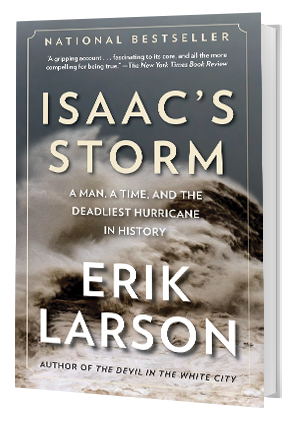Thanks are owed to the good friend who introduced me to the genius of author Erik Larson.
I’m finishing up Thunderstruck, so am learning more about Marconi than my old man, a PhD RF (wireless) engineer, knows. I do appreciate now the magic and mystique of the rather rarefied field of wireless. In fact, I’m quite captivated by it.
Isaac’s Storm: A Man, a Time, and the Deadliest Hurricane in History is riveting—it taught me about the Galveston Hurricane, the most lethal natural disaster in US history, instantiating the arrogance of US climate scientists even in 1900. The state’s scientists dissed and cancelled (as in banned) the Cubans–who understood the science of hurricanes well before us–sacrificing about ten thousand souls.
I learned so much about the intrigue—and role of the British Empire, the Admiralty, in particular—in leading Lusitania, a luxury British passenger ship, right to the German, U-Boat assassins. The book is Dead Wake: The Last Crossing of the Lusitania.
And who knew Chicago had such uniquely problematic soil? Larson does! Just as he conveys a solid grip of wireless technology in Thunderstruck, or the science of hurricanes in Issac’s Storm, Larson goes into the geology of the city and the great architecture and architects of fin de siècle America, all in The Devil in the White City: Murder, Magic, and Madness at the Fair That Changed America.
(George Washington Gale Ferris, Jr. wanted to best Gustave Eiffel, so he gave us the American version of the Eiffel Tower, the Ferris wheel, which, during the 1893 World’s Columbian Exposition, carried up to … 2000 people. All new and wondrous to me.)
There are always parallel murder plots, where you learn about the mass murderer du jour or wife killer on the cross-Atlantic lam. These are made all the more suspenseful if you DO NOT GOOGLE them.
Larson weaves gorgeously written, multi-layered, primary-source based yarns about epic historic events. And he never visits the Internet for his research, but, rather, works in libraries and wherever rare artifacts and documents are stowed.
On LinkedIn, a variety of people keep propagating on my page with fluffy effusions about their writing careers. Having sampled a paragraph or two of these people’s “prose”—and then promptly unfollowed the particular umbrella association that represents them (us “writers”) and advances the careers of these scribblers—I would advise these producers of piss-poor prose, first to quit assaulting the eye. But if they wish to improve, study Larson: structure of plot and sentences, syntax, how he starts a sentence; his use of adjectives, how he builds tension.
Still, there should be a guild that pays most “budding” writers not to write.
UPDATED (9/23/022): One of our readers is a descendant of brave survivors of the 1900s Galveston Hurricane. What tough, admirable people American were. Many still are: MAGA.
Re: Galveston hurricane of 1900, my maternal grandfather's father and brother, who immigrated from Germany in 1886 through Galveston, survived the 'Great Storm' & then rescued people stranded on rooftops with a two-man rowboat. Over 8K died, 10K homeless.
— DaveForTexas™ (@DaveForTexas) September 24, 2022



 print
print